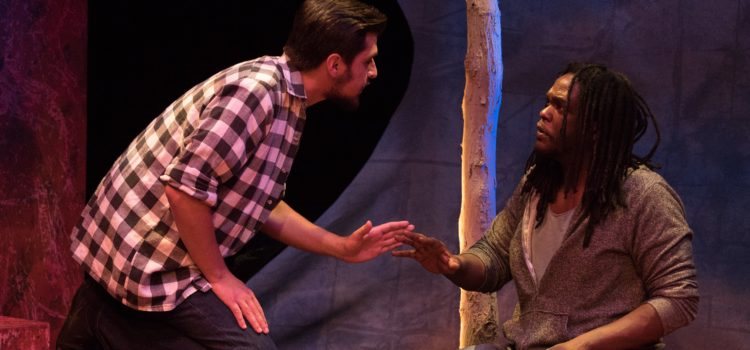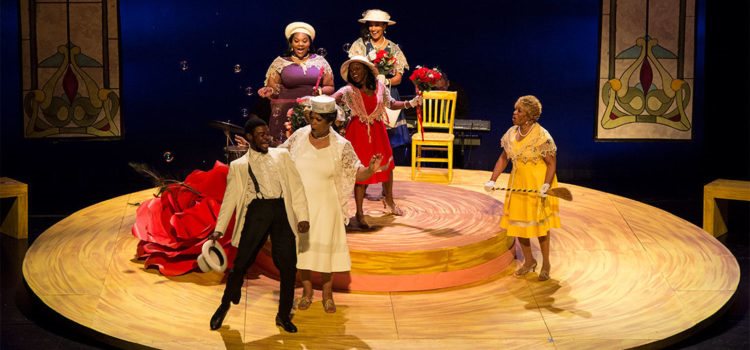By Lynn Venhaus
Managing Editor
Radiant performers in a shimmering production of “The Little Mermaid” chased the gloom away on a chilly, gray day, as their contagious joy on the Touhill stage was a sight to behold.
The 10th anniversary musical by Variety – the Children’s Charity of St. Louis — Theatre celebrated their special achievement as the only production of this kind in the U.S. in royal fashion Friday evening, their third of six performances Thursday through Sunday, Oct. 18 – 21.
What Variety Theatre has done in the past decade is truly remarkable – involving an inclusive children’s ensemble who learns theater mechanics, confidence and performing skills alongside a professional adult cast – in a first-rate production. The good cheer that emanates from everyone involved is something special – and it’s one of the high points of my theater-going every year.
Director and Choreographer Lara Teeter’s vision for this anniversary revival was inspired, especially emulating ocean movement and boosting minor roles. He kept everything bright and breezy.
This year’s production designs are of highest quality, with a breathtaking fantasy seascape set by Dunsi Dai that incorporated ethereal views from the scrim. Nathan Scheuer’s lighting design enhanced the warm, wonderful make-believe world under the sea – and simulated storms and the dangers down below as well. Rusty Wandall’s sound design astutely captured sounds of sea, sand and sky.
With superb aerial work, Berklea Going, as spunky Ariel, appeared to be swimming, and her realistic rescue of a sinking Prince Eric (David Bryant Johnson) was a stunner.
The 18-piece orchestra, expertly led by musical director Mark Schapman, pulled us into Menken and Ashman’s lush musical score, and the peppy calypso beat ramped up the fun.
That island vacation sound is personified by the lively Sebastian, the red-suited crab who tries to keep headstrong Ariel out of trouble. In a star-making performance, newcomer Michael Hawkins was a delight in song, dance and showmanship – and very funny.
With his lead on the show-stopping number, “Under the Sea,” the vibrant characters swirling in action were so splendid that they received an enthusiastic – and lengthy – standing ovation.
This year’s high-spirited cast portrayed Disney’s enchanting animated characters with great verve, from the vivid sea creatures, chefs and maids to the principals in familiar roles they made their own. Their glistening outfits from Kansas City Costume burst with color and imagination.
When Disney transformed the 1837 Hans Christian Andersen fairy tale about a young mermaid who wants to live as a human into a full-length animated musical film in 1989, it was the start of a new era.
Composer Alan Menken and lyricist Howard Ashman, who died in 1991, wrote Broadway-caliber songs for their original movie score of “The Little Mermaid,” so adapting it for the stage seemed like a logical step. However, it didn’t make it to Broadway until 2008, with additional songs by Menken and lyricist Glenn Slater, and book by Doug Wright.
Ashman and Menken’s 1991 Oscar-nominated “Beauty and the Beast” came first to Broadway, in 1994 and enjoyed a 13-year run. As a special treat, Variety is fortunate to have the original “Beast,” three-time Tony nominee Terrence Mann, anchoring this production as King Triton.
With his glorious rich voice and commanding stage presence, the six-foot-tall Mann is sensational as the passionate and powerful ruler of the underwater kingdom, helping to make this show unforgettable.
His robust and regal performance is captivating, and even though he’s the marquee draw, Mann doesn’t allow himself to be center of attention, becoming an intrinsic part of the large ensemble as if it were his family.
A tip of the hat to the man who first became a star as Rum Tum Tugger in “Cats,” originated Javert in “Les Miserables,” and earned his third Tony nomination as Charlemagne in the Tony-winning 2013 revival of “Pippin.”
Along with the seamless integration of disabled youth in a children’s ensemble, as well as top-notch teens and adults, and dazzling production values, this is the best Variety musical yet. They feel like a family, for there is such warmth and affection expressed throughout the show.
From the adorable Ian Nolting as Flounder to the comical Alan Knoll as loyal Grimsby, the characters fit in both worlds.
The innovative flourishes to stand-out characters made them particularly memorable here. The agile Drew Humphrey, dandy as Scarecrow last year, charmed everyone as the wacky sidekick seagull Scuttle, and the nimble dance number “Positoovity” was a highlight in a show filled with them.
Joy Boland is a formidable villainess as wicked octopus Ursula, and her impressive sidekicks, Brandon Fink and Mason Kelso as evil electric eels Flotsam and Jetsam, were nimble foes.
Ariel’s lively Mer-Sisters were particularly strong, in songs and their comical family bickering – I looked forward to their appearance every time they sashayed out in their sequined outfits. complete with moving tails, and big-haired wigs. The six spry siblings Chandler Ford as Aquata, Larissa White as Andrina, Corbyn Sprayberry as Arista, Dena DiGiancinto as Atina, Caitlyn Witty as Adella and Allison Newman as Allana were a hoot.
John Kinney as Chef Louis is another crowd-pleaser in madcap dinner number, “Les Poissons.”
Berklea Going was a likable Ariel, sweet-voiced and sincere, and she paired well with David Bryant Johnson as equally likable Prince Eric.
With its bright tempo, romantic story and charming characters, “The Little Mermaid” is a bubbly confection for children and adults alike. Variety’s production, infused with heart and humor, sparkled and shined.
Variety Theatre presents “The Little Mermaid” at 7 p.m. Oct. 18, 19 and 20, and also at 10 a.m. Oct. 19, 1:30 p.m. Oct. 20 and 1:30 p.m. Oct. 21 at the Touhill Center for the Performing Arts on the UMSL campus. For tickets or more information, visit www.touhill.org and www.varietystl.org.

Lynn (Zipfel) Venhaus has had a continuous byline in St. Louis metro region publications since 1978. She writes features and news for Belleville News-Democrat and contributes to St. Louis magazine and other publications.
She is a Rotten Tomatoes-approved film critic, currently reviews films for Webster-Kirkwood Times and KTRS Radio, covers entertainment for PopLifeSTL.com and co-hosts podcast PopLifeSTL.com…Presents.
She is a member of Critics Choice Association, where she serves on the women’s and marketing committees; Alliance of Women Film Journalists; and on the board of the St. Louis Film Critics Association. She is a founding and board member of the St. Louis Theater Circle.
She is retired from teaching journalism/media as an adjunct college instructor.




